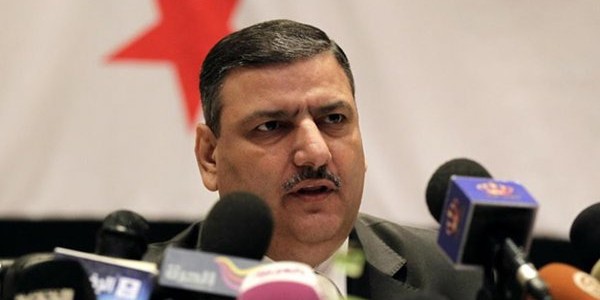PHOTO: Coordinator of the opposition-rebel bloc, former Syrian Prime Minister Riad Hijab
LATEST
UPDATE 1630 GMT: UN envoy Staffan de Mistura has stepped back from inviting officials from the Syrian Kurdish Democratic Union Party (PYD) to Friday’s Geneva talks.
De Mistura told French Foreign Minister Laurent Fabius that he had not invited any PYD representatives.
Russian Deputy Foreign Minister Gennady Gatilov confirmed the report but said Kurds may take part in a later stage of Syrian peace talks.
Russia had included PYD leader Saleh Muslim on its list of 15 names to be invited, and Syrian activist Randa Kassis — who has been asked to attend — said on Tuesday that Muslim had also received an invitation.
Both the Turkish Prime Minister and Foreign Minister said Ankara would boycott the talks if the PYD was present.
UPDATE 1545 GMT: French Foreign Minister Laurent Fabius has insisted that the opposition-rebel bloc will attend the Geneva talks on Friday.
Fabius said after meeting UN envoy Staffan de Mistura:
I spoke to [opposition-rebel coordinator Riad] Hijab….He will respond to [UN envoy Staffan] de Mistura and [UN Secretary-General] Ban Ki-moon this morning. If I understand their position, they say yes to negotiations.
However, an “opposition source” said the bloc, meeting in Riyadh, is still seeking an answer from de Mistura about meeting its preconditions, including ceasefires, detainee releases, and access to humanitarian aid for besieged areas: “We sent the questions. We are awaiting the response.”
ORIGINAL ENTRY: Syria’s main opposition-rebel bloc has confirmed that it will not attend UN-brokered talks in Geneva on Friday.
After meeting on Tuesday, the bloc said that it was suspending involvement in the process because preconditions for discussions had not been met. These included ceasefires with a halt to Russian and regime bombing, release of detainees from regime prisons, and humanitarian aid for besieged areas. It reiterated in a statement and in letters to the UN that the confidence-building measures must be implemented to ensure a productive engagement with the Assad regime.
US Secretary of State John Kerry had indicated last weekend that the conditions should not be met before the discussions, but should be addressed during the talks. UN envoy Staffan de Mistura had also given no sign that the issues should be addressed in advance of negotiations.
Instead, de Mistura sent invitations on Tuesday to some of the delegates on an alternative list of 15 names proposed by Russia. Invitees included Saleh Muslim, head of the Kurdish Democratic Party (PYD); Ilham Ahmed, a leading member of the Kurdish Democratic Society Movement; Randa Kassis, President of the domestic group Movement of the Pluralistic Society; Haitham Manna, head of the recently-created Syrian Democratic Council; and Qadri Jamil, a former Cabinet member with long-standing ties to Moscow.
The opposition-rebel bloc, established last month at a conference in Saudi Arabia, excluded the PYD. The President of the Syrian National Coalition, Khaled Khoja, said on Tuesday:
Russia’s Foreign Minister Sergei Lavrov seeks to deceive the world by insisting on presenting the PYD as the Kurds’ sole representative in the upcoming negotiations. There are two members representing the Kurds in the opposition’s negotiating delegation formed by the High Negotiations Committee in Riyadh, and there are Kurdish members in all the bureaus and bodies formed thereafter.
The bloc maintains that the domestic Syrian politicians promoted by Russia are too close to the regime to constitute an opposition.
The opposition Local Coordination Committees supported the decision to stay away from Geneva. It said the delegates should reject any form of dictation and extortion and not be moved by pressure” from an Obama Administration which was moving closer to the Russian position behind the Assad regime.
Last weekend Kerry told the coordinator of the opposition-rebel bloc, former Prime Minister Riad Hijab, that it must attend Geneva or face a loss of support, according to senior opposition figures.
Kerry denied that he made the demand.
Turks Warn of Boycott of Talks
De Mistura’s invitations also defied a challenge by Turkish Prime Minister Ahmet Davutoglu and Foreign Minister Mevlut Çavuşoğlu that Ankara will boycott the meetings if the Kurdish PYD attends.
The Turkish Government maintains that the Syrian Kurdish movement is led by the Turkish Kurdish insurgency PKK, which has pursued an armed campaign for more than 30 years for autonomy. A ceasefire between Ankara and the group broke down last July.
However, Haitham Manna, one of the delegates on the Russian list, said he would not participate unless the PYD’s Saleh Muslim and another Kurdish leader, Ilham Ahmed, were also invited.
The Saudi Embassy to the UN issued a statement on Tuesday night backing the opposition-rebel bloc, “We commend the efforts of the opposition and the composition of the Supreme Commission for the negotiations, and we will continue to fully support the Syrian people to maintain unity of Syria.”
Lavrov Rejects US Request to Stop Bombing of Opposition Areas
Russian Foreign Ministry Sergei Lavrov has publicly rejected a US request to stop attacks on opposition-held areas of Syria and to focus on the threat of the Islamic State.
Lavrov said in a Tuesday press conference, “[US Secretary of State] John Kerry said in a telephone talk on inter-Syrian negotiations that some gestures should be made because the opposition in Riyadh will not go anywhere ‘as long as they are bombed for nothing.”
He responded:
We proposed to the US to organize daily coordination but there is no answer. And then they say: “You’re bombing the wrong people.” I’m at a loss. This is not a serious, adult-like talk. We have confirmed that our proposals on daily coordination remain in force and it is necessary to establish it and not simply to perform procedures helping avoid incidents.
Lavrov also said attention to starvation caused by the Syrian military’s sieges — such as the blockade on Madaya which has reportedly led to the deaths of more than 60 people — is a “fetish” to avoid political negotiations.

